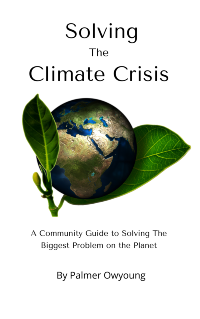It is one of the biggest issues on the planet, but not many people want to discuss it. The problem I am referring to of course is climate change. When you do try to discuss it you are often met with vacuous stares, shoulder shrugs, and accused of being full of doom and gloom.
If you are in a room full of people who enjoy discussing politics you invariably get the Democrats blaming Republicans for their denial, and the Republicans blaming Democrats for their naivete. But none of that solves anything.
Talking about climate change is a bit like talking about having cancer. We know there is a problem, but nobody wants to discuss it because we think the solutions are going to be more painful than the actual disease. In the case of cancer, today sadly this is oftentimes, true, but with climate change that’s not necessarily the case. Some solutions can make the world a better place to live, but they will require making a few sacrifices in the short term to have a better future in the long term.
So, the question is if climate change is the biggest problem on the planet why don’t more people care?
Journalist Lisa Bennet spent five years interviewing Americans and climate experts to co-author Ecoliterate, a book addressing ecological issues in education. According to her, there are five reasons why people don’t care more about climate change-
1. We are short-term thinkers.
We evolved to think about immediate threats such as wild animals and the need for food in water, things that can kill us relatively quickly. So it’s difficult to wrap our minds around things like melting ice caps and increasing temperatures that can take years or decades to unfold. However, with the increase in extreme weather events like heat waves, droughts, floods, and hurricanes, the immediacy of it is starting to become clear and attitudes are starting to change.
2. It is expensive.
In 2008 and 2009 the world was dealing with the global financial crisis and we thought the effects of climate change were still decades away. In 2020-2022 we have been dealing with the uncertainty of COVID-19, which cost the economy trillions in losses.
Then there is the fact that climate change deniers love to point out that getting off fossil fuels will lead to lost jobs and a potential economic collapse.
But these scenarios simply are not true. All the science says that mitigation will be far less costly than dealing with the consequences of record-breaking floods, fires, and hurricanes, which already cost hundreds of billions to deal with. If things get much worse, it will cost in the trillions annually. The most recent estimate says that mitigating climate change will cost us about 2-3% of global annual GDP, which would translate to about 1.7-$2.6 trillion per year. Although this is a substantial amount of money between 2020-2021 the world spent $10.6 trillion just on the COVID pandemic.
Furthermore, if we do this right moving off fossil fuels can create more jobs than we lose. According to a study by the World Economic Forum, it could generate $10.1 trillion in annual business and create 395 million jobs by the end of 2030, while repairing nature and making our planet more livable.
3. We are not as connected to nature as we once were.
Most people spend their lives indoors now. Whether it is at home, at work, in a car, or at a shopping mall we don’t spend as much time communing with the natural world as our ancestors did. Kids especially spend more time on their computers and playing with their gadgets than playing outside. This makes it difficult to understand nature and has made it difficult for us to understand and care for it.
The irony is that our health and happiness are connected to having healthy ecosystems. One study says just two hours per week spent in nature can improve your mental and physical health, while also improving your mood.
4. No one believes they can make a difference.
Climate change is a massively complex issue that we are all a part of. If you eat food, drive a car, or fly in an airplane then you are contributing to it. But it is also being created by multi-national corporations that earn billions each year and create elaborate marketing campaigns and pays to have pseudo-science published that confuses everyone.
It can make the average person feel powerless to create any meaningful change.
5. There isn’t enough time.
In the modern world, much of our lives are devoted to just making a living. Add in a family, some time for friends and leisure, and the fact that inflation is eroding our purchasing power and it does not leave a time for influencing the government or fighting multi-national corporations.
However, things are starting to change and many companies are experimenting with a four-day work week. It has already been successful in Iceland, where workers have lower levels of stress, and improved quality of life, and the UK also ran a successful experiment.
Maybe in the not-too-distant future, we can use that extra one day a week and devote it to the environment. We could use the extra day for climate activism, lobby the government, organize boycotts of corporations, or work on community bioremediation projects.
We Need to Change Our Minds to Change the System
So, to effectively fight climate change, we need to make changes in how we think. Yes, it is easier said than done, but we need to start somewhere.
1. Like our health, we need to start thinking in terms of long-term goals in five to ten years spans rather than by the year.
It is similar to thinking about healthy eating. You don’t just eat one meal or work out one time and think that you are going to be healthy. It is about adopting a sustainable lifestyle. It is difficult to think about these things when you are just trying to pay the rent and bills but there are simple day-to-day things you can do that make a difference over time. See 10 Ways to Reduce Your Carbon Footprint for some ideas. This includes changing your carbon footprint, but it also means changing your carbon shadow, which is how your actions affect the people around you. For example, you can write a column for your local newspaper, start a blog, or YouTube channel, or join a local climate activism group.
2. Reconnect with the natural world by taking a walk in the park, going for a hike in the hills, or walking down to your local beach at least two times per week.
This will not only make you happy and healthier it will also remind you that these places are worth fighting for. This means asking our governments to regreen our cities with trees, flowers, and plants. This can not only reconnect us to nature but can also cool the ambient temperature, improve the air quality, reduce our stress, and improve our health.
3. We need to rethink our economic system that allows corporations to lie and manipulate the public and corrupt our leaders while putting their profits ahead of the well-being of the planet.
We can begin by supporting the carbon tax and dividend scheme that redistributes money from polluters to the people who need it to reduce their carbon footprint.
4. We need to change the behavior of the very wealthy, who emit the most CO2 with their egregious consumption habits while paying little or no taxes to solve the problem.
We can do this by voting for wealth taxes on the extremely rich, like that proposed by Thomas Piketty, which puts a 2-3% tax on those who are worth $100 million or more.
5. We can also change our consumption habits by making minimalism a lifestyle instead of living beyond the means of our finite resources.
6. We need to change our beliefs about what we can do as individuals.
Not that you are not going to solve this all by yourself, but studies show that our behaviors can affect others through 3 degrees of influence. In other words when you make a change that doesn’t just affect you but it can affect your friend and your friend’s friend’s friend. This is how the world changes
To find out what you can please read “The Most Important Thing You Can Do To Fight Climate Change.”




